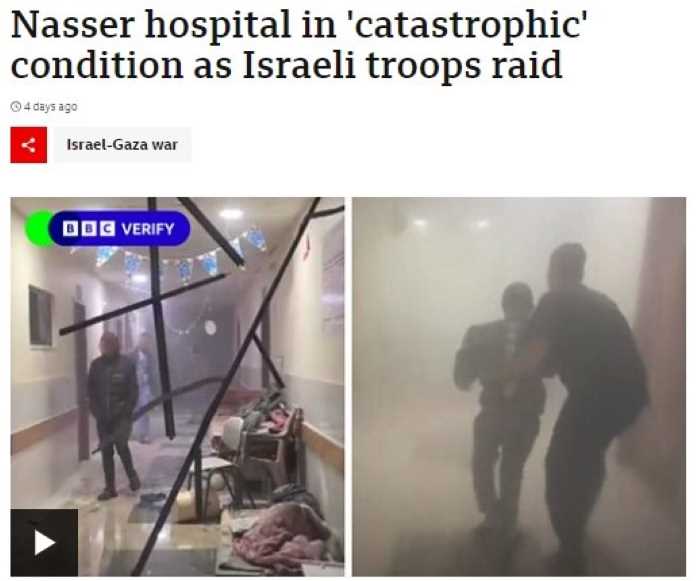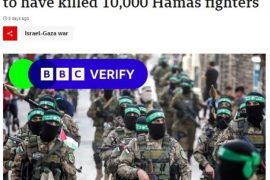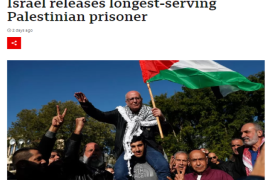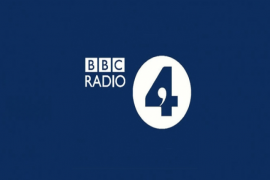The recent IDF operation at the Nasser hospital in Khan Younis received considerable coverage on the BBC News website.
That coverage began on the afternoon of February 14th – before the operation had commenced – with a report written by David Gritten and titled “Israel orders evacuation of largest hospital in southern Gaza” in which BBC audiences were told that: [emphasis added]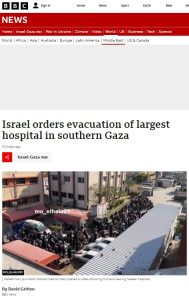
“Palestinians say Israeli forces have ordered thousands of displaced people to evacuate the largest hospital in the south of the Gaza Strip.
Videos showed an announcement via loudspeaker and a crowd leaving the Nasser Medical Complex in Khan Younis.
Israel’s military said it had opened a secure route for civilians, but did not intend to evacuate patients and medics.
Doctors and health officials say a number of people there have been killed by Israeli sniper fire in recent days.
The reported deaths came as battles between Israeli troops and Hamas fighters raged in the vicinity of the hospital, which the UN says has been under siege for around a week and is only minimally functional.
Intense hostilities have also been reported around the nearby Al-Amal hospital, which the Palestinian Red Crescent said was raided last week after some 8,000 displaced people and patients complied with an order to evacuate.
The Israeli military has previously accused Hamas fighters of operating from inside and around the two hospitals – a claim that the armed group and medical officials have denied.”
While choosing to amplify those denials from Hamas and “medical officials”, Gritten fails to inform his readers that rocket fire from within the grounds of the Nasser hospital had been documented a month earlier and that some twenty terrorists had been captured in the PRCS-run Al Amal hospital just days prior to the publication of his report.
Gritten also refrains from telling readers that already on January 26th the IDF had advised civilians taking shelter at the Nasser and Al Amal hospitals of the appropriate evacuation route.
Gritten’s report nevertheless uncritically promotes Hamas propaganda, which he apparently knows to be untrue because he goes on to quote other statements contradicting the terrorist group’s false claims:
“Later, Gaza’s health ministry put out a brief statement accusing Israeli troops of “forcibly evacuating” thousands of displaced people, medical staff and patients from Nasser hospital.”
As clarified by the IDF Spokesman: [emphasis added]
“A key objective as defined by our military mission is to ensure that the Nasser hospital continues its important function of treating Gazan patients. We communicated this in a number of conversations we had with the hospital staff over the last few days. We emphasized that there is no obligation for patients or staff to evacuate the hospital. However, we have been urging other Gazans, in Arabic, on the phone and via loudspeakers, to move away from the danger that Hamas puts them in — via a humanitarian corridor we opened for this purpose.”
Another quote promoted in Gritten’s report comes from the World Health Organisation:
“The director-general of the World Health Organization (WHO) wrote on X, formerly Twitter, that he was alarmed by what was reportedly happening.
“Nasser is the backbone of the health system in southern Gaza. It must be protected,” he warned. “Humanitarian access must be allowed.”
“Hospitals must be safeguarded so that they can serve their life-saving function. They must not be militarized or attacked.””
Gritten makes no effort to inform BBC audiences of the circumstances in which hospitals lose their protected status. Neither does he clarify that in line with the requirements, advance warnings were given to the hospital’s manager to cease all military activity within the hospital’s compound.
On February 15th the BBC News website published a report by Raffi Berg and Paul Adams headlined “Nasser hospital in ‘catastrophic’ condition as Israeli troops raid” which opens as follows: [emphasis added]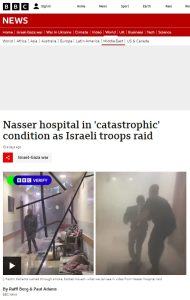
“Israel’s military claims it has captured “dozens” of terror suspects during a raid on southern Gaza’s main hospital, as staff and patients were forced to flee under gunfire.
Israel said it launched a “precise and limited mission” at Nasser hospital in Khan Younis, adding it had intelligence that Hamas had held hostages there.
Hamas dismissed the claim as “lies”.”
Quoting the IDF Spokesman, the report goes on:
“He said that interrogations of “terrorists who were arrested or surrendered in the area” and the testimonies of freed hostages, had “determined that kidnapped Israelis were previously held in the hospital compound”.”
Berg and Adams did not provide readers with further information about those filmed interrogations and testimonies in their own words.
More Hamas propaganda is promoted later in the report:
“Thursday’s operation came a day after the IDF ordered thousands of displaced people who had been sheltering at the site to leave.
Israel’s military said it had assured Nasser hospital staff that patients and staff were not obliged to leave, and that medics could continue treating Gazan patients.
Dr Ashraf al-Quadra, a spokesperson for the Hamas-run health ministry in Gaza, denied that was the case, saying Israeli troops had forced the hospital management to “keep intensive care patients without medical equipment”.”
The fact that the IDF had facilitated the transfer of medical supplies and equipment, including oxygen, as well as fuel to the hospital is not mentioned by Berg and Adams. Already on February 15th the identities of some of those arrested who took part in the October 7th massacre had been made public. Despite Berg and Adams’ report having been last updated on the morning of February 16th, that information was not included.
Also on February 15th the BBC News website published a filmed report by BBC Verify headlined “BBC Verify: What we can see in video from Nasser hospital raid” which is credited to Soraya Auer and Jemimah Herd.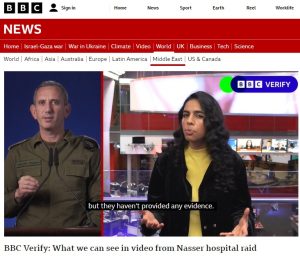
“This [sic] situation in southern Gaza’s largest hospital is “catastrophic” after an Israeli raid, its director has told the BBC.BBC Verify has been analysing footage on the ground, which shows smoke-filled corridors, bodies being moved and people working to the sound of gunfire.
Israel’s military says it is carrying out a “precise and limited mission” at Nasser hospital after receiving intelligence that bodies of hostages taken by Hamas were being held there.
Reporter Merlyn Thomas breaks down what we know so far.”
In that video Thomas tells viewers that:
Thomas: “The Israeli army claim that they have intelligence that Hamas held hostages in Nasser hospital, but they haven’t provided any evidence.”
That statement of course negates the existence of the filmed interrogations of terrorists and the testimonies from former hostages.
Another filmed report published on the BBC News website on February 15th is headlined “Inside Nasser hospital as Israeli forces launch raid”. Its synopsis again promotes Hamas propaganda. [emphasis added]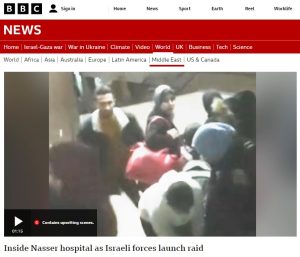
“Israel’s special forces have carried out a raid on the besieged Nasser medical complex, the main hospital in southern Gaza.
The Israel Defense Forces (IDF) said Hamas fighters were hiding inside and that Israeli hostages’ bodies might also be there.
A spokesperson for Hamas denied that, calling it “lies”.
The sounds of battle and aftermath of the raid can been [sic] heard and seen in videos posted to social media and verified by the BBC.”
On February 16th the BBC News website published a report by two journalists, neither of whom was reporting from the region, titled “Gaza’s Nasser hospital: Fears for patients as Israeli raid continues”. Credited to Rushdi Abu Alouf in Istanbul and Kathryn Armstrong in London, that report opens with the promotion of an unevidenced claim from a terrorist organisation: [emphasis added]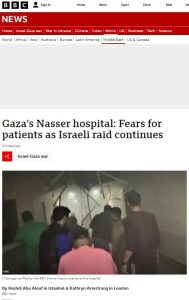
“The Israeli military says its special forces are still inside the Nasser hospital in Gaza as fears grow for patients at the site.
Israel launched what it described as a “precise and limited mission” there on Thursday. The military says it has caught “dozens of terror suspects”.
Hamas dismissed that claim as “lies”. The Hamas-run health ministry said five people died after generators failed.”
Later in the report readers are again told that:
“The Hamas-run health ministry reported on Friday that the five people who died at the hospital did so after the electricity generators went down and oxygen could not be provided.
The deaths have not been independently verified.”
That report was not updated to clarify to BBC audiences that the IDF had put out a statement concerning Hamas’ allegations and other claims promoted in the BBC’s report.
“This morning (Friday), a report was received concerning the interruption of generator activity, resulting in the failure of electrical systems within the hospital. Contrary to the allegation, IDF troops did not target the generators. The troops were instructed to ensure the continuous functioning of the hospital. However, despite the generator malfunction at the hospital, all vital systems continued to operate throughout the day based on the existing Uninterruptible Power Supply (UPS) system in the hospital. During the day, upon receiving the report of the hospital generator malfunction, IDF troops worked to repair the generator, while simultaneously Shayetet 13 special forces brought in an alternative generator to the hospital. These actions were carried out in close coordination between the IDF and the hospital administration through officers of the Coordination and Liaison Administration for Gaza (CLA). In addition to bringing in an alternative generator, the IDF supplied food for infants and water to the hospital. The CLA also coordinated with international aid organizations to supply diesel fuel to maintain hospital activity.”
The discovery of mortars, grenades and other weapons inside the Nasser hospital received just one sentence of coverage in Abualouf and Armstrong’s report:
“The IDF said that among those it had captured at the hospital were 20 Hamas members who were part of the 7 October attacks on Israel.
It also said it had found weapons, including grenades, at the facility.”
On February 18th the BBC News website published an uncredited report headlined “WHO says Gaza’s Nasser hospital not functional after Israel raids” which includes yet another ‘he said-she said’ account: [emphasis added]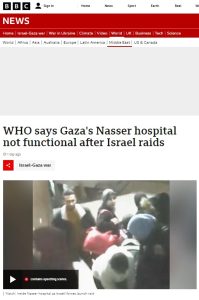
“One source inside the hospital, who did not want to be named, told BBC News that 11 patients had died due to interruptions in the supply of electricity and oxygen, and that several doctors had been arrested.
The Israeli military said no-one died as a result of its actions, adding that its troops had been told to keep the hospital running.
It said diesel and oxygen supplies had been taken to the facility, and that a temporary generator was operating.”
Readers are not told that some of the Hamas terrorists in the hospital were posing as medical staff.
On February 20th the BBC News website published a filmed report titled “Watch: WHO releases video from inside raided Gaza hospital”.
“UN doctors were granted access to the Nasser Medical Complex on Sunday, two days after Israeli troops raided the facility after reportedly receiving intelligence that hostages were being held there.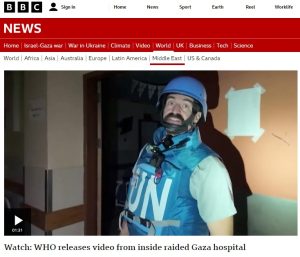
Video filmed inside shows medical workers evacuating patients by torchlight and describing damage to the facilities. One UN doctor describes the scene as a “death zone”.
Gaza’s Hamas-run health ministry on Monday said 14 patients had been transferred to other hospitals.
The Israeli military says no-one died as a result of its actions and that its troops have been told to keep the hospital running.”
As we see, none of the above seven BBC reports informs audiences of the discovery of vehicles stolen in Israel on October 7th and medications bearing the names of hostages at the Nasser hospital. While the fact that over a hundred terror suspects were arrested in that hospital is not adequately clarified in any of those reports, the BBC was however more than happy to repeatedly promote Hamas’ claim that the announcements concerning the arrests of those terror suspects were “lies”.
The first mention of those vehicles and packages of medications came in an eighth report published on the afternoon of February 20th. Written by David Gritten and headlined “WHO fears for remaining patients at Gaza’s Nasser hospital”, that article includes superfluous punctuation around the word terrorists: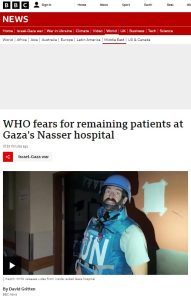
“According to the Israeli military, they have detained hundreds of “terrorists” and found weapons and medicines intended for Israeli hostages held by Hamas since entering the facility last Thursday. […]
On Sunday, the Israeli military said commandos had detained “hundreds of terrorists and other terror suspects who were hiding in the hospital”, including some who had participated in the 7 October attacks, those with connections to the hostages and significant Hamas operatives.
They also found large quantities of weapons, a vehicle used on 7 October and another that belonged to an Israeli kibbutz which was attacked, as well as named boxes of medicine which should have been transferred to Israeli hostages under a deal agreed last month, it added.”
Gritten’s report also mentions the IDF’s delivery of food, fuel, medicine and a generator by the IDF. However, like its predecessors, that report also includes the uncritical promotion of Hamas propaganda:
“Hamas – which is proscribed as a terrorist organisation by Israel, the UK and others – has denied allegations that its fighters use hospitals for cover, saying they are being used as a pretext to destroy Gaza’s healthcare system. […]
Gaza’s health ministry said Israeli forces had converted Nasser hospital into a “military barracks” and that the situation there had “gone beyond a disaster”, posing a direct threat to the lives of the patients and staff.”
The body which turned the Nasser hospital – and others – into a military site is of course the terrorist organisation Hamas. If the aim of these eight reports in a period of seven days was to inform BBC audiences not only what had happened at the Nasser hospital but why, then the repeated uncritical promotion of Hamas propaganda – and the serial failure to explain to readers and viewers that this incident is precisely an example of the circumstances under which hospitals lose their protected status – clearly compromises audience understanding both of this particular story and similar ones.
Related Articles:

